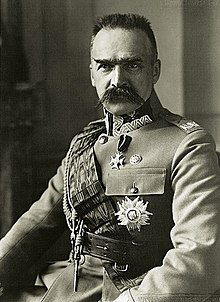

Chief of State
Józef Klemens Piłsudski 5 December 1867 Zułów, Vilna Governorate, Russian Empire
12 May 1935(1935-05-12) (67) Warsaw, Poland
22 November 1918 – 14 December 1922
Polish politician, First Marshall and Prime Minister (1867–1935) This article is about the Polish chief of state. For other uses, see Pilsudski (disambiguation). In this Slavic name, the surname is Piłsudski, sometimes transliterated as Pilsudski. Józef Klemens Piłsudski (Polish: ( listen ) ; 5 December 1867 – 12 May 1935) was a Polish statesman who served as the Chief of State (1918–1922) and First Marshal of Poland (from 1920). He was considered the de facto leader (1926–35) of the Second Polish Republic as the Minister of Military Affairs. After World War I, he held great power in Polish politics and was a distinguished figure on the international scene. He is viewed as a father of the Second Polish Republic re-established in 1918, 123 years after the final Partition of Poland by Austria, Prussia and Russia in 1795. Seeing himself as a descendant of the culture and traditions of the Polish–Lithuanian Commonwealth, Piłsudski believed in a multi-ethnic Poland—"a home of nations" including indigenous ethnic and religious minorities he hoped would establish a robust union with the independent states of Lithuania and Ukraine. His principal political opponent, Roman Dmowski, leader of the National Democrat party, by contrast, called for a Poland limited to the pre-Partitions Polish Crown and based mainly on a homogeneous ethnically Polish population and Roman Catholic identity. Early in his political career, Piłsudski became a leader of the Polish Socialist Party. Believing Poland's independence would be won militarily, he formed the Polish Legions. In 1914, he predicted a new major war would defeat the Russian Empire and the Central Powers. After World War I began in 1914, Piłsudski's Legions fought alongside Austria-Hungary against Russia. In 1917, with Russia faring poorly in the war, he withdrew his support for the Central Powers, and was imprisoned in Magdeburg by the Germans. From November 1918, when Poland regained its independence, until 1922, Piłsudski was Poland's Chief of State. In 1919–21 he commanded Polish forces in six border wars that re-defined the country's borders. On the verge of defeat in the Polish–Soviet War in August 1920, his forces threw back the invading Soviet Russians at the Battle of Warsaw. In 1923, with the government dominated by his opponents, in particular the National Democrats, Piłsudski retired from active politics. Three years later he returned to power in the May 1926 coup d'état and became the strongman of the Sanacja regime. From then on until his death in 1935, he concerned himself primarily with military and foreign affairs. It was during this period that he developed a cult of personality that has survived into the 21st century. Some aspects of Piłsudski's administration, such as imprisoning his political opponents at Bereza Kartuska, remain controversial. Yet, he is highly-esteemed in Polish memory and is regarded, together with his chief rival Roman Dmowski, as a founder of modern independent Poland.

We use cookies
We use cookies and other tracking technologies to improve your browsing experience on our website, to show you personalized content and targeted ads, to analyze our website traffic, and to understand where our visitors are coming from. Privacy Policy.